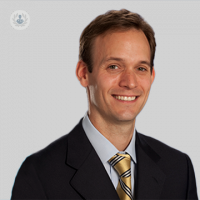When should my child undergo a tonsillectomy?
Written by:Have you noticed that your child is experiencing difficulty breathing at night, or that they struggle to swallow their food? These could be signs of an issue with their tonsils.
In this article, Mr Richard Hewitt, a highly experienced and well-regarded consultant children’s ENT specialist, tells us why a tonsillectomy might be performed on children, and how this tonsil-removing procedure is typically performed.

Why might a tonsillectomy be performed on children?
Children can suffer from tonsillitis occasionally, but it is not very relevant for them, as they will commonly quickly recover from it and never have it again. However, some children’s tonsils can become damaged. They can, as a result, suffer from recurrent tonsillitis, and children can suffer up to six or seven episodes of tonsillitis per year. This is when we consider removal.
Children’s tonsils can also be too large, and can also grow due to infection. Symptoms such as difficulty breathing through the nose, potential difficulty swallowing, and difficulty breathing at night can all be experienced by children. As a result of these symptoms – particularly not being able to breathe and rest properly at night – can cause mild obstructive sleep apnoea.
We also consider a tonsillectomy if one of the tonsils is growing abnormally and we cannot pinpoint the exact reason for this.
How is a tonsillectomy performed?
The modern techniques that we have developed for very small children involve leaving the capsule of the tonsil completely untouched. This specific tonsillectomy allows us to gently shave parts of the tonsil we do not like, but leave behind tonsil tissue in the capsule in order for functional tonsil tissue to be untouched. No blood vessel is touched.
We do have to remove the tonsil if there is a recurrence of tonsillitis. This occurs due to the fact that it is quite possible for remaining tonsil tissue left behind following a tonsillectomy to become infected. These are the two main techniques we think of when addressing the tonsils surgically.
How safe is tonsillectomy, and what are the risks?
The main risk is post-operative infection. The child will be given antibiotics to try to avoid this. The child will have to take painkillers as well in order to be able to eat and drink comfortably. Also, some of the blood vessels can start to leak and cause bleeding.
Tonsillectomy is performed very routinely and is very safe. The new techniques mean that there is less risk, and the child can recover very quickly, suffering little to no pain after the operation.
What can be eaten after a tonsillectomy?
Drinking lots is good and easy for children. My advice would be to eat whatever the child feels like eating.
How long does pain last following a tonsillectomy?
Discomfort can be significant, but some children are so used to throat pain that they barely notice the pain after surgery. The child’s throat can become quite itchy a few days after their tonsillectomy. Usually, after about eight or nine days, children are back to normal. Ibuprofen or Calpol are almost always enough to deal with the pain.
Book an appointment today with Mr Richard Hewitt if you feel as though your child would benefit from having their tonsils removed, or simply if you would like to check the state of your child’s tonsils. You can book an appointment with Mr Hewitt via his Top Doctors profile today.


